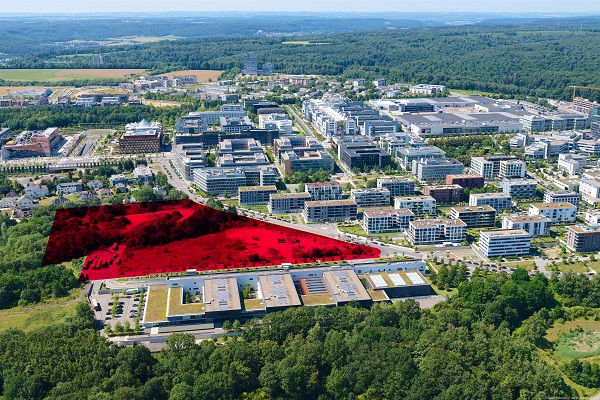 Grünewald Ouest in Kirchberg;
Credit: Fonds Kirchberg
Grünewald Ouest in Kirchberg;
Credit: Fonds Kirchberg
Luxembourg's Ministry of Mobility and Public Works and Ministry of Housing have announced that the Logement Kirchberg Fund (Fonds d'urbanisation et d'aménagement du plateau de Kirchberg, or Fonds Kirchberg) is increase its affordable housing offer.
At a joint press conference, Luxembourg's Deputy Prime Minister and Minister of Mobility and Public Works, François Bausch, and the Minister of Housing, Henri Kox, presented the future development of the Kirchberg district in terms of housing, emphasising a social and urban mix. According to long-term projections, some 27,500 inhabitants will live in Kirchberg and two-thirds of the homes will be considered affordable. The ministers thus presented the roadmap for a targeted and ambitious construction programme that will accelerate the creation of affordable housing.
The Kirchberg Fund, a public establishment under the supervision of the Minister of Mobility and Public Works, will build more than 7,000 dwellings on its land with the main objective of offering a wide range of quality dwellings, accessible to all incomes. In the short term, i.e. by 2023, approximately 757 apartments will be put up for sale in the Réimerwee Est and Ouest areas, Domaine Kiem and in part A of a new zone to be urbanised on land stretching on the south side of Avenue John F. Kennedy.
Then, over the next five years, the Kirchberg Fund plans to start implementing new special development plans in JFK Sud Zone B, Grünewald Ouest, along Boulevard Konrad Adenauer, on the Laangfur site and on the site of the former Eurocontrol building. In the medium term, i.e. by 2026, 1,038 dwellings will be available in the aforementioned areas. By 2030, 1,360 homes will have been added in the JFK Sud Zone B, Grünewald Ouest, Laangfur, Rue Tony Rollman and Kuebebierg sections. Finally, the Kirchberg plateau will experience its maximum development with the completion of the large urban extension at Kuebebierg / Laangfur and with the transformation of the Luxexpo site.
The urbanisation of the last large land reserve entirely belonging to the Kirchberg Fund, namely the Kuebebierg (24 ha), will make it possible to create some 3,127 dwellings in a district of short distances with innovative concepts aimed at securing the energy autonomy of the district by the exploitation of solar energy, water management based on its maximum reuse as well as an alternative co-mobility to the individual use of cars.
Mobility Minister François Bausch explained: “Thanks to the investments that we are currently making in Kirchberg and in particular in the housing sector, Kirchberg will develop and will become a lively, mixed and interesting district. The face of the Kirchberg will soon change from a satellite city to an urban district with a pleasant atmosphere of life".
According to current estimates, the total number of inhabitants in Kirchberg will increase from 4,000 today to around 27,500 people in the next ten to 20 years. At the same time, the number of employees frequenting the district will also continue to increase (from 42,000 today to 66,700 beyond 2040), but at a slower pace with the objective that there will ultimately be one inhabitant for 2.4 employees; the ratio is now 1:10.
To tackle the surge in real estate prices and manage the shortage of affordable housing, the Kirchberg Fund will impose capped prices on the developers with whom it works for the completion of most of future projects. The land is made available only in the form of long lease for a period of 99 years, so that the fund retains a right of first refusal.
The Kirchberg Fund will try to cover in its offer a wide range of affordable housing, both for rental and for sale. There are two price categories for affordable sale: prices per square meter lower by at least 60%, and prices which are at least 40% lower than the market price. These prices are subject to conditions depending on the target buyers. In the rental segment, two price ranges are used: a first bracket where prices are between €5 and €10 per square metre and a second bracket between €10 and €20 per square metre. The Kirchberg fund aims to increase the share of affordable housing from 32% at present to two-thirds of all housing within its perimeter.
Housing Minister Henri Kox concluded: "In Kirchberg, there is an exceptional opportunity for the state to set up on a large scale, together with a public actor, this targeted housing policy with a differentiated affordability, which the government is promoting in order to allow the population to access adequate and payable housing".








